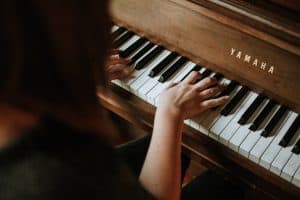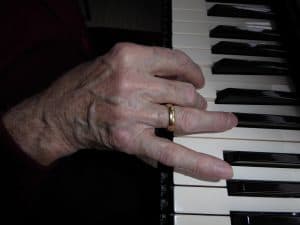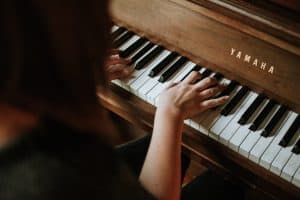Piano Blog by Skoove – Piano Practice Tips
It’s a common misconception that your ability to learn new things and pick up new skills is truncated, diminished, or otherwise compromised once you reach adulthood.
You hear about classical and pop musicians getting their start on the piano at age three or five or seven and then transitioning to other instruments or to composition, growing their skills and ultimately becoming “masters” of the craft. But this is far from the only timeline by which it is acceptable, or possible, to become proficient at the piano and at music in general.
That isn’t to say learning styles do not change with age; adults who are taking up a practice for the first time can differ drastically from children at the same skill level.
For one thing, adults have years of life experience–including successes and failures–on which to draw, or by which to be held back. It can sometimes get in the way of their approaching a new skill from a no-holds-barred perspective of pure curiosity.
Even so, it doesn’t mean they can’t pick up the skill. You can read more on adult learning techniques here.
So there may be more challenges, or at least more mental roadblocks, standing in the way of a full-grown adult who is approaching the piano cold. When you consider this, consider also that if we let every mental roadblock stop us, we would never do anything! It’s often easier than you realize to get out of your own head and feel freer to try something at which you are not guaranteed to succeed.
We have emphasized in the past that the thing that makes a musician is practicing music.

As long as you demonstrate the interest and try to demonstrate it as consistently as you can, the rest will fall into place. It hardly matters that you did not devote your whole life; if you devote five minutes a day to your practice, you are connecting with the piano, appreciating music, and steadily getting better, even if in ways that are not always immediately apparent.
Remember that it is your practice. At the end of the day, you are the one benefiting from it, and you are (ideally) not pursuing it for anyone’s edification other than your own.
Your age does not compel you to sit down and play through a complex page of sheet music flawlessly. Nothing at all compels you to do that, in fact, no matter your experience.
You learn at the rate you learn, and a lifelong willingness to learn puts time on your side–regardless of the time you think you’ve “wasted.” And you’ll feel gratified for having challenged yourself.
On that note–pun intended–fortify your practice with the material that interests you.
If you want to play sonatinas, by all means pick up a book; if you want to play pop songs, don’t let any preconceived notions of what a “real pianist” plays deter you.
The more excited you are about what you’re playing, the more you’ll play, and the more satisfying and fulfilling your practice will become.
Along your journey, lean on the people around you and ask for their support. This need not be in the form of their listening to you play or otherwise directly charting your progress–for many adults, especially the overthinking, judgment-fearing kind, this can feel like the exact sort of pressure that dissuades them from practicing. But even something as simple as a coworker inquiring, “So, how goes the piano learning?” can go a long way toward pushing you forward.
Consult your musically inclined friends and acquaintances for tips and tricks they’ve accumulated over the course of their practice. In the deeply human practice of art, your fellow human beings are some of the most valuable resources at your disposal.
Well, then, what are you waiting for? Find the nearest keyboard and go to it!

We’ll leave you with a few frequently asked questions about learning and practicing as an adult:
How should I go about learning the piano?
Certainly there is no single “right” way to go about it. There’s a multitude of resources that can instruct you (or help you instruct yourself) in the mechanics and theory of piano, from looking into lessons at local music schools to downloading or subscribing to online tutorials. Learning styles vary from person to person, so feel free to explore a variety and a combination of options.
The best way is to have regular access to a keyboard; this will help you feel the most comfortable and achieve the fastest, most substantial results. Physical keys are preferable, but virtual ones work too!
What if I don’t know how to sing…or do anything else musical?
Not to worry! The piano provides a solid introduction to the world of music as a whole. It can serve as a foundation upon which to develop other musical skills and pick up other instruments, or it can simply stand alone as its own skill.
Though you might not realize it at first, playing the piano will improve your recognition of and response to pitch, your differentiation between intervals, and your understanding of chord progressions, among many other things. And you’ll be honing your inner ear and general aural capabilities alongside your piano skills just by practicing. Before long you may even find yourself placing notes or intervals with your own voice!
When is it too late to take up the piano?
Trick question: Never! When it comes to learning, a “point of no return” does not exist, whether you’re twenty-one or eighty-one. And when it comes to a skill like playing a musical instrument, the timeline is as prescribed and fixed or as fluid and flexible as you want it to be.
The key to quantifiable results, as we pointed out earlier, is the same with acquiring any skill: consistency. Though you may not notice progress right away, try not to judge yourself by an arbitrary timeline. You are progressing, and your growth will reveal itself in due course, age notwithstanding.

Can you recommend any specific resources?
As a matter of fact (well, as you might expect), we can recommend Skoove! The lessons and pieces of music that it takes you through–from Debussy to Scott Joplin to John Legend–are tailored to your skill level and make it easy for people of all abilities to enter (or re-enter) any stage of practice. At least 50% of our users are beginners at the piano, so never fear: you’re in good company.
Read More
This article is from an external source and may contain external links not controlled by Empeda Music.
